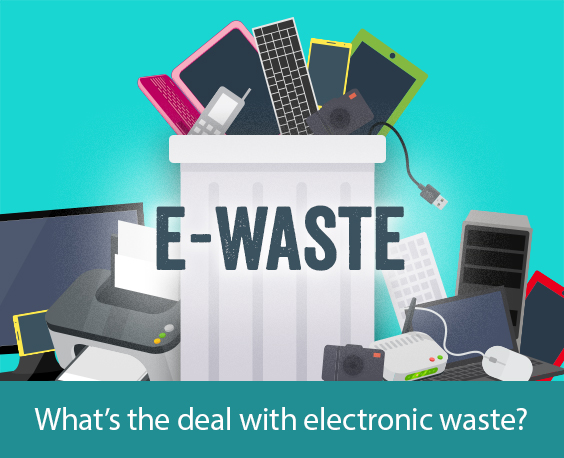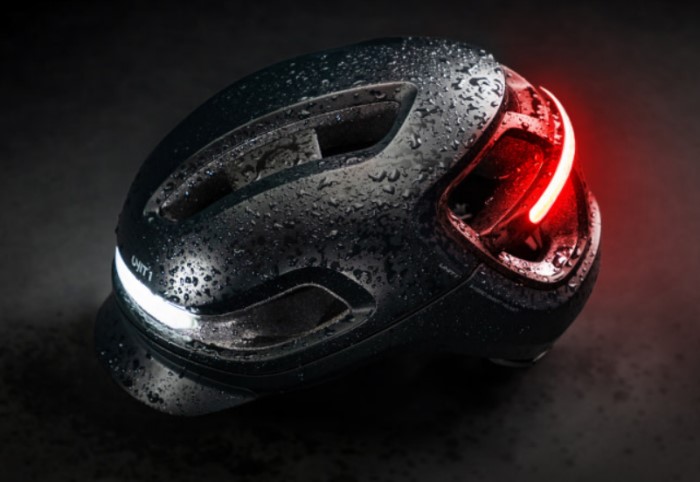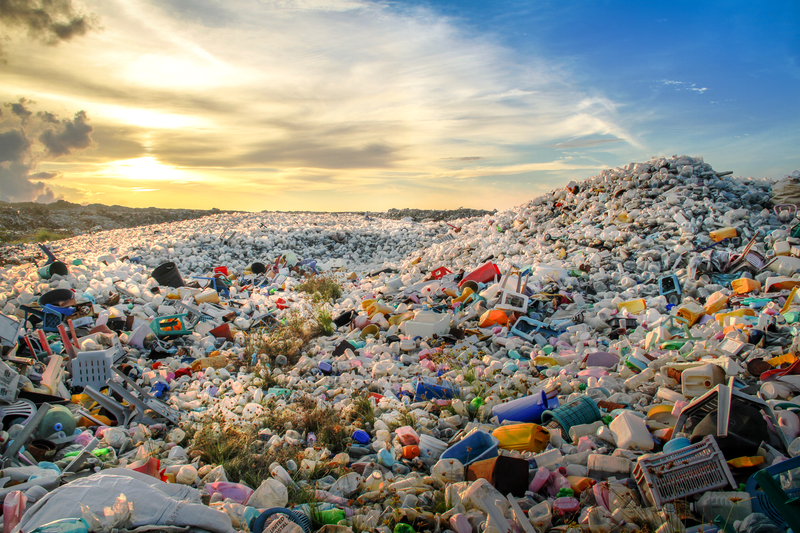Question: How many electronic devices do you and your family have in your house? Two? Three? Five? Eight?
More?
When you stop to add up all of the possible devices—phones, tablets, computers, TV, wireless speakers, printers, modems—one thing becomes clear. No matter the actual number in your home, technology is everywhere and exists in many forms.
This fact leads to a major issue regarding technology today: electronic waste.
Electro-toxic
Piles of electronic waste at a recycling plant. (Getty Embed)
Electronic waste, or e-waste, refers to electronic devices that are thrown away by their owners. This is a quickly growing problem.
Electronics contain all sorts of toxins in their batteries and circuit boards. Mercury, arsenic, and lead are just some of the materials inside that can pollute our air, water, and soil if not properly disposed of. So when that old tablet is chucked in the trash, a lot of bad stuff can leak into our environment.
In addition, many of the important materials in electronics are rare. And getting them costs more than money! Cobalt is necessary for the lithium-ion batteries found in smartphones and computers. A huge percentage of the world’s cobalt comes from mines in the African nation Congo. The miners there work under terrible conditions for very little money.
Whether we’re talking about pollution or human rights, there are big issues around modern technology. That’s why it’s a major concern that we’re not only making more tech than ever before—we’re throwing out more of it, too.
Throw it all away
Television sets like this one were common in the 1960s and 1970s. (Getty Embed)
If you ask your parents—never mind your grandparents—what technology was like when they were your age, you’ll probably hear stories of telephones with cords, televisions with only seven channels, listening to music on battery-powered cassette players, and so on.
But one detail that might not get mentioned right away? How long families held on to those devices.
Devices like TVs, stereos, phones, and alarm clocks were used for years and years. Even if they broke, plenty of repair shops existed to fix them. Modern electronic devices, however, are replaced often. Like, a lot. For example, it’s very common for people to replace their phone after only two years of use. (Yikes!)
Phrase of the day
A lineup for the new iPhone 8 in New York City. (Getty Embed)
“Built-in obsolescence.” (Say: ahb-so-LIH-sens.) Okay, as a phrase, it doesn’t exactly roll off the tongue. But this idea is an important one to be aware of in today’s world.
When something is obsolete, it is no longer useful. Built-in obsolescence is when a company uses certain tricks to encourage, pressure, or even force consumers to upgrade their devices with new ones. These tactics include…
- Newer models: tempting people by releasing “new and improved” versions of popular devices every year or so
- Cheap to buy, expensive to repair/supply: while the device itself is cheap, repairing/buying new supplies for it is so expensive that people just buy a new one to “save money”
- No more updates: most devices use regularly updated apps and operating systems. Companies can refuse to update these programs (such as Facebook) for older devices. Consumers have to buy a new device to continue to enjoy those apps.
In the end, built-in obsolescence means two things. One, even if you take really, really, really great care of a device, there’s sometimes a short limit to how long it’s still going to be useful to you. And two, most people are getting rid of their electronic devices after only a few years.
Recycling program
An old computer is recycled. (Getty Embed)
As we mentioned earlier, the biggest issue with throwing away electronics is what happens with the toxic material inside them.
Thankfully, more and more places are taking this issue seriously. Locations for donations or recycling of used electronics can be found in both large retail chains like Best Buy and Staples, and in various municipal (city) waste management programs. From Vancouver to Winnipeg to Ottawa, cities have special locations where citizens can drop off their old electronics for proper recycling. A few, such as Toronto, will even pick them up along with other waste at the curb (properly separated, of course!).
In fact, studies show that in Canada in 2012, these programs recycled about 4.7 million tonnes of e-waste. That’s about the weight of 26,000 blue whales! And it’s also almost twice as much as was recycled 10 years earlier in 2002.
But if that’s true, then why is this still an issue?
Changing culture takes time
We still throw out far more than we recycle. So while 4.7 million tonnes of Canadian electronic waste was properly recycled, around 9 million tonnes just went straight into the trash. And that was in 2012. Five years later, experts expect the number to be higher still.
The answer? Here are a few things that could help.
- Better programs: Old electronics contain lots of valuable materials—from gold to titanium and more! But removing them takes time. If governments create better recycling programs with more workers, they can handle more e-waste.
- Companies take charge: From recycling plants to training repair people, companies have a chance to both make their electronics more sustainable and create jobs at the same time.
- Buying less: Hey, you knew this one was coming! No one is expecting people to do without smartphones and computers. They are as important now as a pencil and paper was 40 years ago. But taking care of the devices you do have, holding off on replacing them, and considering second-hand options when you do get a new device can all go a long way.
How do you plan on being a responsible user of technology in the future? Let us know!











Excellent article. Very informative. Have passed them on to my adult children. I was surprised when I stopped to count up the devices in our home – we are two seniors. Twenty five years ago we would share the family computer – not any more! I do hold on to items. My phone cracked over two years ago and I still use it – it works. I do not want to update to latest devices. This article has really made me think. I waste a lot of time on social media (as do most people). I will not update a device to keep facebook so will do without in future if that is the case.
Perhaps more use of public devices (at libraries) and printers at places like Staples will be the answer to reducing waste. Remember internet cafes. Now they just offer wifi and you bring your own device.
Manu companies must cooperate to prevent us polluting the world and give up the idea of planned obsolescence to make the capitalists rich on the backs of ordinary people.
This article is a good start. Please consider a follow up on how exactly the recycled electronics is handled after collection. “Recycling” means It does not end up on landfills in Canada, but maybe it ends up on landfills in China?
some relevant links:
https://en.wikipedia.org/wiki/Electronic_waste_in_Guiyu
http://www.vice.com/read/ctrl-v14n9
https://www.youtube.com/watch?v=EXzsqTFwV3Q
Thank for this article.
.Many eons ago when I was young,there was a book by Vance Packard called “Planned Obsolescence” which explained how manufacturers made large appliances that were deliberately built to not last.
Not much has changed and there are so many more products that have been produced.
I don’t see much hope for change as we have so many people who must have the latest device and aren’t interested in recycling. Manufacturers shoul be compelled to take back devices and pay for the retreival all of usable materials.
My husband and I each have 7 year old LG flip phones from Virgin. The phone is capable of texting, emailing and taking photos. We do not subscribe to data so no texting, and no emailing. We don’t even use the phones for photos. We use it to communicate with each other. For a grandfathered account with Virgin Mobile we have a feature called ‘ My Peeps’ which allows us unlimited calling between our cells for $21.00/month, prepaid, each. We have 50 min. of outside calling, Canada wide, including voicemail.
Our TV is hooked up to an interior antenna, not cable, and we have Roku for Netflix and other streaming media.
I have a Samsung tab 3 for emails if we travel but I mostly enjoy audiobooks on it while I sew on my computerized sewing machine.
We have a home computer and a WIFI modem for all else, a printer, and a landline. No need for smart phones, and no need to replace the flip phone. We like the low security risk of our cells and we feel no need to check email more than once /day. We also don’t subscribe to social media.
For us, technology is only a tool, not an obsession.
I take my old phones, old extension cords, electronics, TV, Computer, etc. to the Staples Store for recycling.
I subscribe most to your last point, buying less. I am slowly convincing my family members to reduce their buying but it’s a long, difficult process. It would help a lot if more people agreed to new holiday rules, like minimal gifts for adults or, even better, donations to charities. For kids, we have got to stop trying to buy their love with stuff.
I agree completely. My family usually shares the elerontics, with he execxtion of the parents.
😮 😐 😕
How awsome
Yes! The more we try, the better we’ll be, at using and reusing wisely.